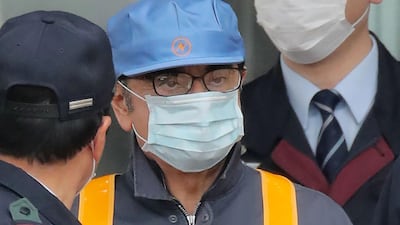Carlos Ghosn on Wednesday walked out of a Tokyo prison on bail after 108 days in detention, vowing to fight allegations of financial crimes that could imprison the former Nissan Motor chairman for upto a decade.
Flanked by police officers and wearing a light blue baseball cap, face mask and eyeglasses, Mr Ghosn left the detention centre where he had been locked up since his November 19 arrest. His bail of ¥1 billion (Dh32.68 million) is among the highest in Japan, Bloomberg reported.
Getting out on bail allows Mr Ghosn to prepare for a trial that is likely to be months away. His surprise arrest and imprisonment on allegations of financial misdeeds roiled the two-decade auto alliance between Nissan and Renault and cast a harsh light on aspects of Japan’s legal system. Mr Ghosn initially was not granted access to lawyers and had two previous bail applications rejected.
“I am innocent and totally committed to vigorously defending myself in a fair trial against these meritless and unsubstantiated accusations,” Mr Ghosn, 64, said earlier.
His release followed a last-ditch appeal by prosecutors to keep him in prison, where he has been confined to a small, unheated room since his arrest. But the Tokyo District Court rejected the motion on Tuesday.
Earlier in the day, a car from the France embassy, where Mr Ghosn holds nationality, arrived at the detention centre in eastern Tokyo as media helicopters swirled overhead. Hundreds of reporters, photographers and TV crews were gathered outside the facility, many of whom had camped overnight to secure positions.
The court granted bail to the former chairman of Nissan, Renault and Mitsubishi Motors after his lawyers gave assurances that he would remain in Tokyo, surrender his passport to his lawyer and submit to extensive surveillance.
Mr Ghosn has also agreed to set up cameras at the entrances and exits to his residence, and is prohibited from using the internet or sending and receiving text messages. He is banned from communicating with parties involved in his case, and permitted computer access only at his lawyer's office.
He faces charges of aggravated breach of trust and under-reporting his compensation to the tune of $82m at Nissan for nearly a decade. If convicted on all charges, Mr Ghosn faces up to 10 years in jail.
“He’s able to collect information and it will be easier to communicate with his lawyers and work out a defence strategy,” said Nobuko Otsuki, a Tokyo-based defence lawyer not connected to the case.
Mr Ghosn's lawyer, Junichiro Hironaka, insisted that his client would stick to the restrictions of his release.
“The bail conditions are severe, but we will make sure to comply with them,” Mr Hironaka said.


